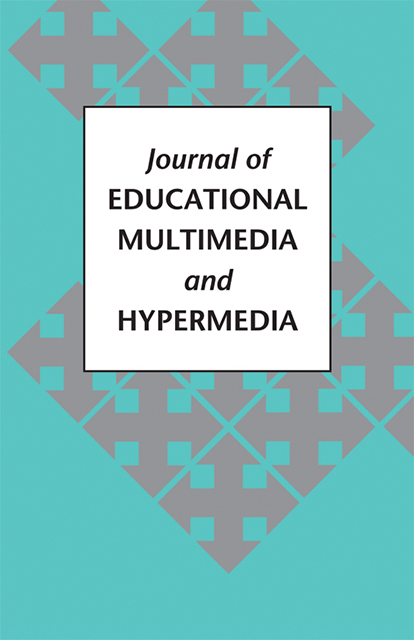
Constructing Knowledge from Dialog in an Intelligent Tutoring System: Interactive Learning, Vicarious Learning, and Pedagogical Agents
Article
Scotty D. Craig, David M. Driscoll, Barry Gholson, University of Memphis, United States
Journal of Educational Multimedia and Hypermedia Volume 13, Number 2, ISSN 1055-8896 Publisher: Association for the Advancement of Computing in Education (AACE), Waynesville, NC USA
Abstract
College students either interacted directly with an intelligent tutoring system, called AutoTutor, by contributing to mixed initiative dialog, or they simply observed, as vicarious learners, previously recorded interactive sessions. The mean pretest to posttest effect size (Cohen's d) across two studies was 1.86 in the interactive conditions and 1.12 in standard vicarious conditions. In Experiment 1, redundant onscreen printed text produced an effect size of 0.43, but the difference was not significant. In addition, the image of a talking head presenting AutoTutor's contributions to the dialog while displaying facial expressions, gestures, and gaze did not produce learning gains beyond those produced by the voice alone. In Experiment 2, the effect size was 0.71 when interactive tutoring was contrasted with the standard vicarious condition, but only 0.38 when compared to a collaborative vicarious condition.
Citation
Craig, S.D., Driscoll, D.M. & Gholson, B. (2004). Constructing Knowledge from Dialog in an Intelligent Tutoring System: Interactive Learning, Vicarious Learning, and Pedagogical Agents. Journal of Educational Multimedia and Hypermedia, 13(2), 163-183. Norfolk, VA: Association for the Advancement of Computing in Education (AACE). Retrieved August 31, 2024 from https://www.learntechlib.org/primary/p/24271/.
© 2004 Association for the Advancement of Computing in Education (AACE)
Keywords
References
View References & Citations Map- Bandura , A. (1962). Social learning through imitation. In M.R. Jones (Ed.) , Nebraska symposium on motivation, (pp. 211-269). Lincoln, NB : University of Nebraska Press.
- Bandura, A. (1977). Social learning theory. Englewood Cliffs, NJ: Prentice Hall. Barker, B.O. , & Dickson, M.W. (1996). Distance learning technologies in K-12 schools: Past, present, and future practice. Techtrends, 41 , 19-22.
- Chi , M. T. H., de Leeuw, N., Chiu, M., & La Vancher, C. (1994). Eliciting selfexplanations improves understanding. Cognitive Science, 18, 439-447.
- Mandler , G . (1975) . Mind and emotion . New York: Wiley .
- Mandler , G. (1984). Mind and body: Psychology of emotion and stress. New York: Norton.
- Mandler , G. (1999). Emotion. In B.M. Bly & D.E. Rumelhart (Eds.) , Cog-
- Mayer, RE. (2001). Multimedia learning. Cambridge, UK: Cambridge University Press.
- Microsoft Agent (1998). Microsoft Corporation http://www.m icrosof t.com / msagen t/
- Moshman , D. (1982). Exogenous , endogenous, and dialectical constructivism. Developmental Review, 2, 371-384.
- Papert, S. (1980). Mindstorms: Children, computers, and powerful ideas. New York: Basic Books.
- Piaget , J . (1970). Genetic epistemology. New York: Columbia University Press. Picard , R . W . (1997) . Affective computing . Cambridge , MA: MIT Press .
- Renwick , W. (1996). Informative technology and the future of postsecondary education. Paris: OECD.
- Rogoff , B. (1990). Apprenticeship in thinking: Cognitive development in social context. New York: Oxford University Press.
- Sweller, J. (1999). Instructional design in technical areas. Camberwell , Victoria, Australia: Australian Council for Educational Research.
- TechSm i th (2001). Camtasia (Version 3.0) [Computer software]. East Lan sing, Michigan: TechSm i th Corporation.
These references have been extracted automatically and may have some errors. Signed in users can suggest corrections to these mistakes.
Suggest Corrections to ReferencesCited By
View References & Citations Map-
Animated Pedagogical Agents: The Effect of Visual Information on a Historical Figure Application
R. Heller & M. Procter, Athabasca University, Canada
International Journal of Web-Based Learning and Teaching Technologies Vol. 4, No. 1 (January 2009) pp. 54–65
-
Interactive Multimedia Module with Pedagogical Agents: Formative Evaluation
Tien Tien Lee & Kamisah Osman
International Education Studies Vol. 5, No. 6 (2012) pp. 50–64
-
The Relationship Between Affective States and Dialog Patterns During Interactions With AutoTutor
Arthur C. Graesser, Sidney K. D’Mello, Scotty D. Craig, Amy Witherspoon, Jeremiah Sullins, Bethany McDaniel & Barry Gholson, University of Memphis, United States
Journal of Interactive Learning Research Vol. 19, No. 2 (April 2008) pp. 293–312
-
Should we question them?: An investigation into the role of deep questions in Vicarious Learning Environments
Scotty Craig, University Of Memphis, United States; Barry Gholson & Jeremiah Sullins, University of Memphis, United States
E-Learn: World Conference on E-Learning in Corporate, Government, Healthcare, and Higher Education 2004 (2004) pp. 1835–1839
These links are based on references which have been extracted automatically and may have some errors. If you see a mistake, please contact info@learntechlib.org.
